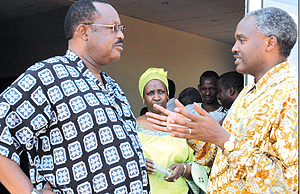NAIROBI - Kenya’s main opposition leader Raila Odinga has warned that the current post-election violence rocking his country could derail the East African Community (EAC)’s aspiration to form a federal state. The opposition leader from the Orange Democratic Movement (ODM), who lost the widely disputed December 27 election to incumbent President Mwai Kibaki, said the instability in East Africa’s largest economy could hurt the bloc’s prospects if the leaders from the five partner states fail to broker an immediate solution.


NAIROBI - Kenya’s main opposition leader Raila Odinga has warned that the current post-election violence rocking his country could derail the East African Community (EAC)’s aspiration to form a federal state. The opposition leader from the Orange Democratic Movement (ODM), who lost the widely disputed December 27 election to incumbent President Mwai Kibaki, said the instability in East Africa’s largest economy could hurt the bloc’s prospects if the leaders from the five partner states fail to broker an immediate solution.
"It would have far reaching consequences,” Odinga said during a radio talk show on one of Uganda’s FM stations on Tuesday evening. "That is why leaders must find a quicker solution,” he added.
He admitted that the violence that erupted immediately after the polls at the end of December has briefly affected the economies of Uganda, Rwanda and Burundi – all landlocked countries that access the sea through Kenya.
Last year, some EAC led by Uganda’s President Yoweri Museveni, embarked on a massive campaign to fast-track a political federation targeting 2011.
However, of the three East African partner states surveyed – Uganda, Kenya and Tanzania – Tanzanians rejected the move to fast-track the political federation, preferring a slower step-by-step process.
But Odinga cautioned that EAC states should have their democratic principles strengthened so as to achieve the bloc’s aspirations.
Like Odinga, some other leaders in the region have anticipated that EAC would face difficulties to achieve a union government because of the Kenyan crisis.
"We are still looking at the instability in Kenya, which is an immediate impact on the region. We shall have to look at the agitation for a federal government later,” Eriya Kategaya, Uganda’s Minister for EAC affairs, who also doubles as the Chairman of EAC Council of Ministers, told The New Times.
"The crisis in Kenya is a tip of the iceberg. In my view the integration process is going to be halted for sometime. Kenya has had a leading role in all negotiations; in Comesa, EAC and other regional blocs. But this time round that role may not be felt anymore after this violence,” Omar Kassim, the First Vice President of the Uganda Chamber of Commerce, said.
However, EAC former Secretary General, Amanya Mushega, urged the present leaders in the region to resolve the issue immediately since it could interfere with the progress of the integration process.
"It should be a concern to all of us. When Kenya had a fair election in 2002 we were extremely proud. But today we should be concerned. The regional community spirit is undermined,” Mushega said.
Kibaki, who named most of his new Cabinet members on Tuesday with no Odonga’s ODM party member, has sent messages to all his EAC counterparts promising that his government was trying to curb the violence which some reports say has left up 1000 people dead.
This week has seen a host of former and current leaders from around the world traveling to Kenya to try to end the stalemate, which has sparked fuel shortages across the region.
Ends


